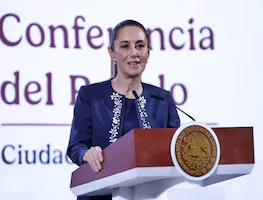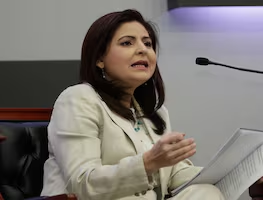Más Información

“En algunos años habrá una secretaria de la Defensa”, afirma subdirectora de la Escuela Militar de Medicina

Claudia Sheinbaum, por definir asistencia presencial a reunión "urgente" de la Celac; migración, tema clave del encuentro

Noroña califica política de EU como hipócrita, racista y fascista; se solidariza con Petro ante deportaciones

Magistrada Mónica Soto propone sustituir al Comité de Evaluación del PJ; plantea someter a insaculación a aspirantes elegibles
The withdrawal of the United States forces from Germany announced by the Trump administration will not only widen the rift between Western allies; it will also provide the opportunity for Berlin to pursue its own strategic interests, often opposed to Washington.
U.S. Secretary of Defense Mark Esper said last week the Pentagon is planning to withdraw nearly 12,000 military personnel from bases in Germany. Around 5,400 will be sent to other European countries such as Italy and Belgium, while over 6,000 will return home.
As part of the changes involving 30% of the 36,000 American troops in Germany, the U.S. European Command and the U.S. Special Operations Command Europe, based in Stuttgart, will be moving to Mons, Belgium. The U.S. African Command is also leaving the southwestern German city, and it is considering options elsewhere in Europe or the United States.
While Esper explained the historic decision as a move that would “in a way strengthen the North Atlantic Treaty Organization , enhance deterrence to Russia and reassure allies,” the White House reiterated its critics to the low German contribution to security expenditures for NATO.
“Germany is delinquent,” affirmed U.S. President Donald Trump, confirming his bad personal relationship with the German Chancellor Angela Merkel . “The United States has been taken advantage of for 25 years, both on trade and on the military. So we are reducing the force because they’re not paying their bills,” he added.
The largest economy in Europe and fourth largest in the world, Germany spends 1.36% of its Gross Domestic Product (GDP) on defense, compared with Washington’s 3.42%. After the Crimean crisis in 2014, NATO members agreed to increase their annual spending to 2%, yet Berlin’s goal is to spend 1.5% by 2024 and reach the 2% mark by 2030.
According to the Stockholm International Peace Research Institute, Germany’s military budget rose last year by 10% to USD $49.3 billion, the largest increase among the world’s top 15 states in the matter. Ironically, Italy and Belgium are well below the 2% mark.
As expected, a majority of Germans are in favor of the drawdown plan. In a YouGov survey , 47% of respondents said they supported reducing the number of U.S. troops; 28% thought the number should remain the same and only 4% was in favor of increasing the number.
However, political and military elites in both sides of the Atlantic are outraged, slamming the plan as a “gift” to Russia in the words of Republican Senator Mitt Romney. Their hopes are now pinned on the possible victory of Democratic hopeful Joe Biden in the November U.S. presidential elections, as well as in the months needed for the withdrawal of troops and equipment, including combat aircraft, tanks, and artillery.
“Germany is a platform that allows us to do rapid reinforcement in Eastern Europe,” summarized the former U.S. Army Europe commander Ben Hodges in an interview with Deutsche Welle . “It gives us a platform for carrying out our own national security strategy in Africa, in Europe, and in Eurasia.”
Stockholm syndrome?
Esper’s announcement came shortly after four German federal states signed a letter asking the U.S. Congress not to allow the repositioning of forces. Currently, the Pentagon has five garrisons in the European country and U.S. military communities have developed around German towns, contributing to their economy.
On the other hand, German nationalists are calling to seize the opportunity to advance an independent foreign policy without the constraints imposed by NATO. They stress that the bilateral disagreements are not limited to the acrimony between Trump and Merkel, as well as the Atlanticist attempts to position her as new leader of the “free world.”
In the postwar era, Germany and the U.S. began to differ since West German Chancellor Willy Brandt promoted his Ostpolitik toward better relations with the Soviet bloc. This was followed by the massive anti-nuclear movement that swept Europe during the 80s and the new global scene born after the fall of the Berlin Wall.
Germany did not support the U.S.-led Gulf War in 1991, yet the foreign policy rift was more evident when the invasion of Iraq took place in 2003. With French President Jacques Chirac, German Chancellor Gerhard Schroeder, a forerunner of energy cooperation with Moscow, opposed the attack, knowing that it would unleash years of regional instability.
At the time, neoconservative U.S. Secretary of Defense Donald Rumsfeld downplayed Germany as part of the “old Europe,” in contrast to the “new Europe” made up by the former Soviet bloc members eager to join NATO and the European Union. It is not a coincidence that these countries are now offering its territory near the Russian borders for the withdrawing U.S. forces in Germany.
For instance, having fulfilled Washington’s demand to spend 2% of its GDP on defense, Poland’s President Andrzej Duda went to the extent of promising over USD $2 billion (EUR €1.6 billion) to create a permanent Pentagon base in Polish territory, which could be called “ Fort Trump .”
In spite of liberal criticism over the current U.S. leader, Germans were also offended by the 2013 spying scandal involving Merkel’s cell phone revealed by National Security Agency whistleblower Edward Snowden. The following year, the new case of senior German officials recruited by the CIA convinced them that the Obama administration was treating their country as an adversary.
The strategic competition between both powers is obvious; although Merkel has supported the sanctions against Moscow, her government is determined to complete the German-Russian Nord Stream 2 pipeline project between this year and 2021.
Nevertheless, the U.S. and Poland see the pipeline, which would double Russia’s gas export capacity via the Baltic Sea, as a threat to Europe’s “energy security,” and other trans-continental projects they support, saying it will strengthen Gazprom’s market dominance.
Beyond the EUR €12 billion invested by Germany in Nord Stream 2, Berlin has rejected Trump’s trade war against China, where the German automotive industry makes between 35% and 50% of its profits, reported WSWS .
Back in 2017, during his state visit to Germany in the framework of the Hamburg G-20 summit, Chinese President Xi Jinping and Merkel defended everything from trade deals to the United Nations and the Paris climate accord repudiated by Trump.
Remarking their “comprehensive strategic partnership,” Merkel declared both countries “can make an effort to soothe this [international] unrest a bit and to make a somewhat quieter world out of it.”
For his part, during an interview with Neue Zürcher Zeitung last week, former German Foreign Minister Sigmar Gabriel underscored that the main question now is who will replace Washington in “Europe’s foreign and security environment.”
He said Berlin’s reluctance to do so was “less due to the unwillingness of the population than to the inability or unwillingness of politicians to speak publicly about these crucial strategic questions.”
As Merkel declared, Europe must “really take our fate into our own hands;” for the European Union’s economic powerhouse this objective includes a turn to its traditional sphere of influence in the east and rearm.
In fact, current President of the European Commission Ursula von der Leyen, then German Minister of Defense; Germany’s President Joachim Gauck, and Foreign Minister Frank-Walter Steinmeier announced in 2014 the end of its military restraint at the emblematic Munich Security Conference.
German think tanks such as the Kiel-based Institute for Security Policies coincided with experts from Merkel’s Christian Democratic Union, and the Social Democratic Party, in calling for a review of defense procurement plans. They noted the transformation of the Bundeswehr (Federal Army) into a rapid intervention force, neglecting its task of “territorial defense” which requires heavy weaponry.
In addition, a study commissioned by Parliament concluded that Berlin could legally finance the French nuclear weapons in exchange for its protection; the European Union could do the same, the analysis found, if it changed its budgeting rules. The document underlined that “Trump and his contradictory statements on NATO” have led to fears “that the U.S. could reduce its nuclear commitment” to Europe.
The road toward a German independent foreign policy has also been marked by contradictions between Berlin’s Atlanticist interests, for instance, heading NATO ’s battlegroup in Lithuania, and its Eastern vocation reflected in Nord Stream 2. However, it is clear that Trump is accelerating the process.
Editing by Sofía Danis
More by Gabriel Moyssen






